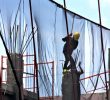PRC to test million-dollar online exam system on seafarers
by LEO J. SANTIAGO
www.ofwjournalism.net
MANILA � NO more lining up for hours under a hot sun to register for the professional exam.� No more waiting in agony for the release of results.
By May, seafarers wanting to take examinations for marine deck officer licenses can register online, take the walk-in computerized exam, and get the results soon after the test.
The Professional Regulation Commission announced recently in a forum the readiness of the computerized walk-in examination process under the Licensure Examination and Registration Information System (Leris).
The long wait is over, PRC chairperson Leonor Tripon-Rosero said, five years after Leris was mandated by a law to computerize examinations to be given to Filipinos from 42 types of professions seeking license or renewal of their license. These include teachers, nurses, mechanical engineers, dentists, and x-ray technicians, among others.
Seafarers would be the first sector on which the system would be applied.
Private firm Geo-Spatial Solutions Inc. (GSI) is crafting and implementing the electronic design that would process thousands of items in a databank of questions, according to Capt. Constantino Arcellana Jr., who is also a member of the board of marine deck examiners.
GSI president Efren Ricalde Jr. confirmed they are readying the platform to implement the Leris for seafarers.
The implementation of Leris was nine years late in coming.
The PRC blamed the delayed implementation on the lack of funding even as the Norwegian Government and the International Maritime Organization donated US$1.2-million in 1997 and a seafarer�s union also donated 40 computers recently.
The PRC also pointed to the lack of security, but Ricalde said this concern has been addressed by GSI as the system would use �state-of-the-art� firewalls and other security features.
�We would not leave any window of opportunity for hackers,� Ricalde said, adding that only professional board examiners could access several points in the system.
A successful online registration and computerized examination at the PRC by seafarers would serve as impetus for offering the system to other professions, Ricalde said.
Convenience
EVERY year beginning 2006, the PRC expects some 5,000 seafarers to register online and take the computerized exams.
Tripon-Rosero said the new system would slash the number of people waiting and milling inside and outside PRC to register and get the results.
One has likened Paredes St, where PRC is located, to a marketplace during Sundays as applicants for new licenses and license renewal rub elbows with vendors hollering for buyers of soft-bound photocopied or printed exam review documents. Some inadvertently enter or loiter even in areas restricted to non-PRC staff.
No more papers, pencils, and the extra time to process the results which usually takes nine days, she added.
Even those in the provinces and overseas could make their inquiries or file for license renewal without leaving their hometown, Tripon-Rosero said of Leris�s potentials.
Chief Mate Ariel Mendoza welcomed the development.
“Convenience” is the operative word, Mendoza told the OFW Journalism Consortium.
Aside from the trouble of traveling to the PRC building, the 25-year-old Mendoza said Leris also allows for flexibility. Most of us cannot predict when we will be free to review and eventually take licensure examinations, he added.
He said he’s looking forward to taking the walk-in exam for master mariner soon.
While he is not sure of passing the exam, he is convinced that it would be beneficial for all seafarers.
�This is history in the making,� he added.
Former PRC examiner Capt. Victor del Prado said industry leaders are optimistic that the walk-in exam would enhance the examination�s integrity and credibility.
PRC Commissioner Avelina dela Rea said she expects Leris would pave the way for online registration, online payment, and other online services of the Commission.
Dela Rea added she believes the project would boost electronic commerce and e-government.
Tech savvy
DELA Rea, who is also Leris project director, was evasive when asked how much a seafarer would shell out to avail of the walk-in exams.
However, she said seafarers could pay electronically via G Exchange of Ayala-owned firm Globe Telecom Inc. or through the facilities of the Land Bank of the Philippines.
Applicants for the online examination for marine deck and engine officers in May need to register first at the PRC website before paying, she said.
She added that applicants must have an email address and a bank account, preferably those releasing cards for automated teller machines-based transactions. Dela Rea said some can use the electronic wallet features of their mobile phones or pay at the PRC personally.
For verification purposes, they must have their documents stored electronically so that anytime we request these or any information these contain, they could just send it via email, Dela Rea added.
Ricalde Jr. said applicants that are technologically-attuned would find the process easy and the exam not “too heavy” compared to those still learning how to use computers.
Those already computer literate would just feel like they’re just playing online computer games, Ricalde added.
However, Capt. Abelardo Pacheco said he is more concerned in making the system produce not only “tech-savvy” but more globally qualified Filipino marine officers.
Del Prado interjected saying the “question bank” should have at least 5,000 questions so that PRC can proceed to publishing the entries in the question bank.
Pacheco said, overall, he sees the Leris helping boost the country�s niche as supplier of marine deck officers, something that has been needed in view of a worldwide shortage for these skilled workers. (OFW Journalism Consortium, Inc.)










